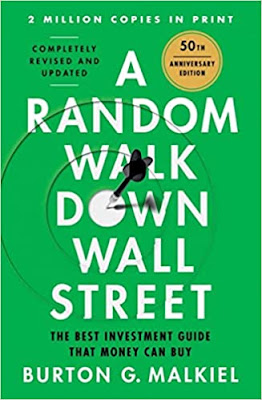"A Random Walk Down Wall Street" by Burton G. Malkiel is a classic book on investment that emphasizes the importance of a passive, low-cost, and diversified investment strategy.
The book argues that trying to beat the market through stock picking or market timing is generally a losing game, as stock prices already reflect all available information and are therefore essentially random. Instead, the book recommends investing in index funds or exchange-traded funds that track broad market indices, such as the S&P 500.
Malkiel also discusses other investment vehicles, such as bonds and real estate, and provides advice on portfolio construction and risk management. The book is written in a clear and accessible style and has been widely read and recommended by both individual investors and financial professionals.
You should read "A Random Walk Down Wall Street" by Burton G. Malkiel if you are interested in investing and want to learn about the most effective investment strategies for long-term success.
The book is considered a classic in the field of investment and provides a wealth of information on topics such as market efficiency, portfolio diversification, and risk management. It offers a persuasive argument for the benefits of passive, low-cost, and broadly diversified investment strategies, and is likely to challenge your assumptions about the best ways to invest your money.
The book is written in an engaging and accessible style, with numerous real-world examples and practical advice that can be applied by both novice and experienced investors. Overall, if you want to become a more informed and effective investor, "A Random Walk Down Wall Street" is an excellent resource that can help you achieve your investment goals.
Although "A Random Walk Down Wall Street" is widely respected and considered a classic investment guide, it is not without its critics. Some common criticisms of the book include:
Oversimplification: Some critics argue that Malkiel oversimplifies the complexities of the financial markets and the investment process. They contend that his arguments are too general and do not account for the nuances of specific investment strategies or market conditions.
Ignoring active management: Malkiel's book argues that actively managed funds generally do not perform better than index funds over the long run. However, some investors and financial professionals believe that active management can be effective in certain circumstances and that index investing may not be the best approach for everyone.
Market efficiency assumptions: Malkiel's argument relies on the assumption that markets are perfectly efficient, meaning that stock prices reflect all available information. Some critics argue that this assumption is flawed, as stock prices can be influenced by emotional factors, political events, and other unpredictable variables.
Limited perspective: Malkiel's book is primarily focused on investing in US equities and does not provide much guidance on international investing, fixed-income investments, or other asset classes.
Despite these criticisms, "A Random Walk Down Wall Street" remains a valuable and influential guide for many investors. While it may not provide a comprehensive or definitive approach to investing, it offers important insights into the benefits of passive, low-cost, and diversified investing strategies that are widely supported by academic research and empirical evidence.
